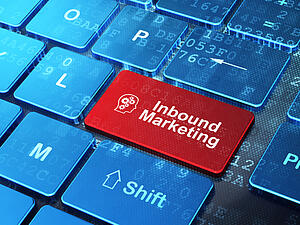 A specialist in inbound marketing has the tools and expertise to apply inbound principles to any business or industry. Your marketing team has the expertise in your particular business. Put them together and you have an unstoppable marketing dynamo.
A specialist in inbound marketing has the tools and expertise to apply inbound principles to any business or industry. Your marketing team has the expertise in your particular business. Put them together and you have an unstoppable marketing dynamo.
The key point here is that inbound marketing works for every business, no matter how small the niche or how big the enterprise. Each business will use inbound a little differently according to the industry and audience but the concept remains viable for all. It’s a flexible framework that provides an extremely cost effective way to get the word out about your business to all the right people.
The way inbound works is by producing and promoting highly relevant content tightly targeted to a particular audience or persona. Any leads are scored to determine how close the lead is to buying and all quality leads enter into a nurturing program designed to provide the right type of content for their position in the marketing and sales funnel. Everything is measured for success; anything performing below par is either reworked or scrapped.
Targeting
Your business is not the same as any other and neither are your customers. But basic inbound marketing tells you to know your customers well enough to place them into segments according to interest and readiness to buy. Then you create content that appeals to each and every segment, adapting it to that segment’s problems and how they talk about them.
Do you serve a specific geographic area? Location marketing can be added to your targeting repertoire to get the message to those who are looking for something in their area. If you are expanding into other cities or regions you can add those location names to your keyword bundles. Keyword research will show if you need to tweak the terms.
SEO and Search Marketing
How do potential customers find products and services? For B2B over 70% of them look for solutions using a search engine. Do you know the terms they use when searching? And are you using those terms, or keywords, in your content?
Inbound marketing depends on the appropriate use of keywords and phrases to guide qualified leads to your content, preferably over someone else’s. Each industry and business has its share of specialized words and jargon but an inbound marketer will make sure the targeted audience also uses those words. If they don’t, the inbound specialist researches to find out the audience’s keyword and uses it in content.
If the keywords are highly competitive, the inbound marketer optimizes for the keyword or phrase that brings in the most qualified leads and highest conversion rates for the lowest cost, especially if using paid search. If you sell titanium combination locks, the term “locks” will bring in too much unqualified traffic. The phrase “combination lock” will narrow the field but still be highly competitive with too many unqualified leads.
The customers who definitely want and need a titanium combination lock will eventually use the entire phrase to find the companies selling that item. You will get a better ROI, more qualified leads, and a much higher conversion rate competing for this specific keyword phrase. And inbound gives you the flexibility to do that.
Social Media
Inbound marketing includes finding out where your ideal customer hangs out on the social networks so your marketing team can concentrate their efforts there. Besides the Big Three (Facebook, LinkedIn, and Twitter), more industry specific networks are starting to pop-up.
Do you support market sustainability? Sustainable.org is a specialty network devoted to this subject. In the fashion industry? Look into Kaboodle. Engineering? CR4 is your network. A survey of current customers and prospects may help you uncover some of these niche networks as can searching for social+media+networks+for-(fill-in-the-blank).
Social media networks not only provide another outlet for your content but also play a role in search marketing and backlinks. An inbound marketer can help your team find these networks and leverage them to your advantage.
Analytics
An inbound marketer can help your team identify the appropriate key performance indicators (KPIs) to track so you can identify underperforming material or networks, get in-depth information on high performers and make adjustments where needed. Inbound marketing includes setting up A/B testing between two similar pieces of content to see which performs better before committing a large investment with a particular phrase, content type, or topic.
Analytics also helps you determine quality of leads, score them, and begin sharing content that is specific to that lead’s position in the buying cycle. As content is produced and measured, your team will begin to see what works best and use these facts as parameters for future content and campaigns.
Do you know what type of content your target audience prefers? Inbound marketing can tell you. Video is a highly successful type of content in certain industries and niches. Others do better with blogging, white papers, or other text based content. Images can play a huge role in product manufacturing and other highly visual areas. For instance, architects often need to see how something will look and prefer an image over an explanation.
Conclusion
Inbound marketing is perfect for any type of business. An inbound specialist can work with the rest of the marketing team to produce highly relevant content that attracts highly qualifies leads that convert. The inbound specialist brings expertise in the methods and practices of inbound marketing while the marketing team has the depth of product knowledge to put content together that means something to your prospective customers.
Consider providing an inbound marketing subject matter expert to guide your marketing efforts. A good inbounder will learn about your company and industry as she goes yet will give value from the very beginning.

